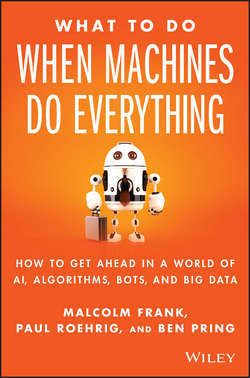Читать книгу What To Do When Machines Do Everything - Roehrig Paul - Страница 8
На сайте Литреса книга снята с продажи.
1
WHEN MACHINES DO EVERYTHING
But Will I Be Automated Away?
ОглавлениеWe have already proven that we love to consume AI-based products (with our rabid usage of the FANG vendors’ offers on our smartphones). And, through digital that matters, the new machine is poised to transform the primary institutions of our society for the better.
Yet once we get over our initial awe of the new machine, we start to wonder how it will impact jobs. What will happen to all those bankers, drivers, radiologists, lawyers, and journalists? What will happen to…me? Will a robot take my job?
Many of us don't know whether this Fourth Industrial Revolution is very good or very bad. It all starts to feel like a capitalist's dream…but a worker's nightmare. And the uncertainty is creating a palpable sense of anxiety, for at a personal level, many of us don't know what to do about it.
Some see only the dark side of this shift, and indeed, many of today's headlines forecast a grim future in a “jobless economy” as robots take over our livelihoods. But the coming digital boom and build-out we describe in the next chapter will be highly promising for those who are prepared. In fact, it will usher in once-in-a-century growth prospects as we reengineer our infrastructure, our industries, and our institutions. Similar to the prior three industrial revolutions, this one will steamroll those who wait and watch, and will unleash enormous prospects and prosperity for those who learn to harness the new machine.
All of this depends on what you do now to prepare for an era when machines can potentially do nearly everything related to knowledge work.
Will many jobs be “automated away” in the coming years? Yes. However, for the vast majority of professions, the new machine will actually enhance and protect employment. We don't think, for example, that a single teacher or nurse will lose their job due to artificial intelligence. Instead, these professions will become more productive, more effective…and more enjoyable. Workers in such professions will come to view the new machine as their trusted colleague. Just as one wouldn't think of driving across London today without an AI-based GPS, or researching a subject without referring to Google and Wikipedia, most workers in the coming years would not consider approaching their daily tasks without a “bot” at their side.
Additionally, entirely new professions will be created, driving employment in fields we can't currently envision (imagine trying to describe a “database administrator” to somebody in 1955). We have much to look forward to if we understand exactly what the new machine can and cannot do and how it will impact the future of work. Some very clear patterns for success have emerged, and we'll spend the rest of the book framing what's going on and providing tactical guidance on how to win in the new digital economy.
